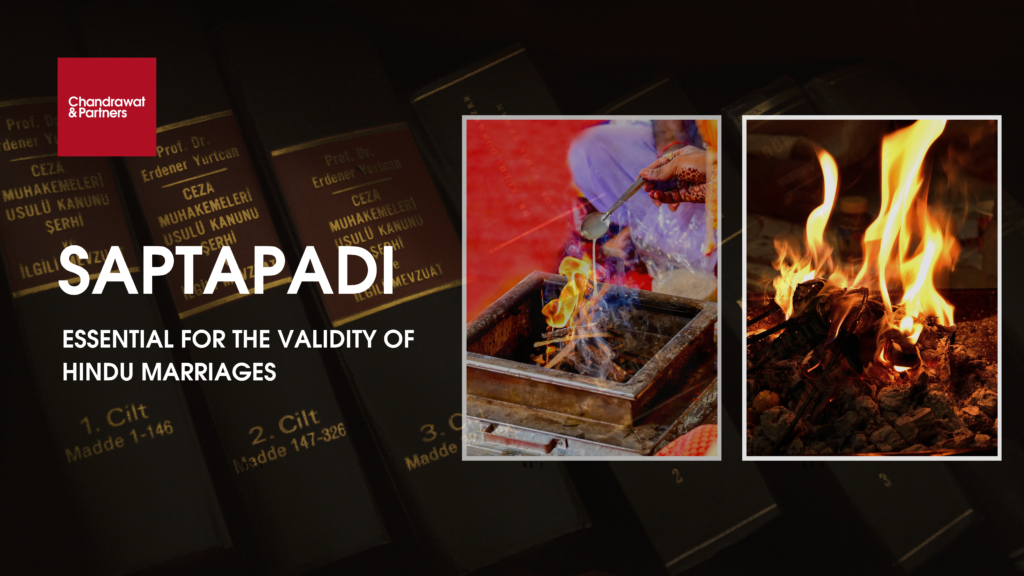
Share :
Introduction
According to the Madhya Pradesh High Court, in Hindu law, a marriage is not considered a contract and cannot be considered legally binding until “Saptapadi” is performed. This statement was made by the Madhya Pradesh High Court in response to a plea filed by four petitioners requesting the dismissal of a First Information Report (“FIR”) filed against them for violations of the Indian Penal Code’s (“IPC”) Sections 366 (abducting or inducing a woman to compel her marriage), 498-A (cruelty), and 34 (common intention).
WHAT IS “SAPTAPADI”?
Section 7 of the Hindu Marriage Act, 1955 stipulates that the performance of certain spiritual ceremonies during marriage is obligatory. This provision mandates such ceremonies to confer the legal status of husband and wife upon the parties involved, as recognized by the law. Section 7 (2) mainly lays out the procedure as to how ‘Saptapadi’ is completed. It is one of the holy ceremonies of marriage. The said sub-section states that where the performing ceremonies include Saptapadi, which means taking seven rounds in front of the holy fire (Agni), they either hold hands or their garments are tied together. Agni is the Vedic God of Fire, who is the witness to all the couple’s promises It is believed that the fire symbolizes both the potent energy of the Sun and the vital life force akin to the digestive fire within us.
According to Hindu tradition, the sacred union of marriage entails more than the joining of names, addresses, families, and minds; it is also believed to unite the souls of the individuals involved. This practice is revered because, on this occasion, the couple is regarded as embodying Lord Shiva and Goddess Parvati, rendering their union exceptionally divine. The invocation of gods and goddesses and the gathering of family and friends serve to solemnize and bear witness to the sanctity and blessing of this union between the partners and their soulmates.
FACTS OF THE CASES
The victim was affirmed to have forcibly carried to Jabalpur, snatched her, and later pressurised her into marking sign-on reports connected with the marriage of the person in question and Petitioner. The respondent contended that a wedding function between the victim and Petitioner number occurred, following the custom of trading garlands and filling up the Maang with Vermilion (Sindoor). They likewise created a marriage testament to help their case.
VERDICT
In the case of Ajay Kumar Jain and others vs. State of Madhya Pradesh and others, the Court noticed that the advice for the Petitioner proved unable to distinguish any arrangement of regulation that recognizes the exhibition of marriage exclusively through the exchange of garlands (Varmala). The court additionally highlighted the meaning of the performance of ‘Saptapadi’ for a substantial Hindu marriage. With this, a bench of Justice Gurpal Singh Ahluwalia dismissed a plea filed by 4 petitioners seeking to quash an FIR lodged against them for offences under Section 366, Section 498- A, Section 34 of IPC.
CULTURAL AND RELIGIOUS PERSPECTIVES
The judgment opens a dialogue about the intersection of legal requirements and cultural or religious practices. It prompts a reflection on the role of tradition in the recognition of Hindu marriages and the evolving nature of family law.
IMPACT ON MARITAL VALIDITY
While many Hindu marriages traditionally involve ‘Saptapadi,’ there are instances where couples may have opted for simplified ceremonies without this ritual. The court’s ruling brings attention to the need for couples to be mindful of the legal significance attached to certain marriage customs.
CONCLUSION
It has been observed by the Madhya Pradesh High Court that Hindu marriages are not contracted and hence Saptapadi is important, otherwise it cannot be said to be a valid marriage. The court emphasized the crucial role of the ‘Saptapadi’ ritual in constituting a valid Hindu marriage. This case highlights the importance of adhering to traditional rituals in determining the validity of Hindu marriages and underscores the court’s role in upholding these cultural norms within the legal framework.
For more information or queries, please email us at
enquiries@chandrawatpartners.com



